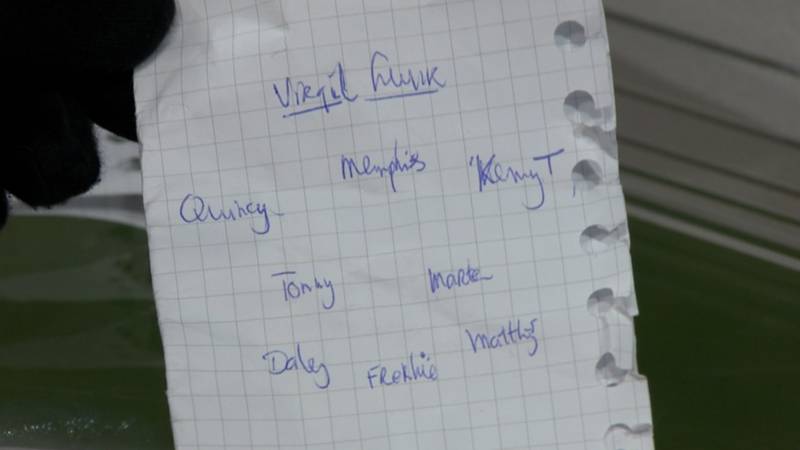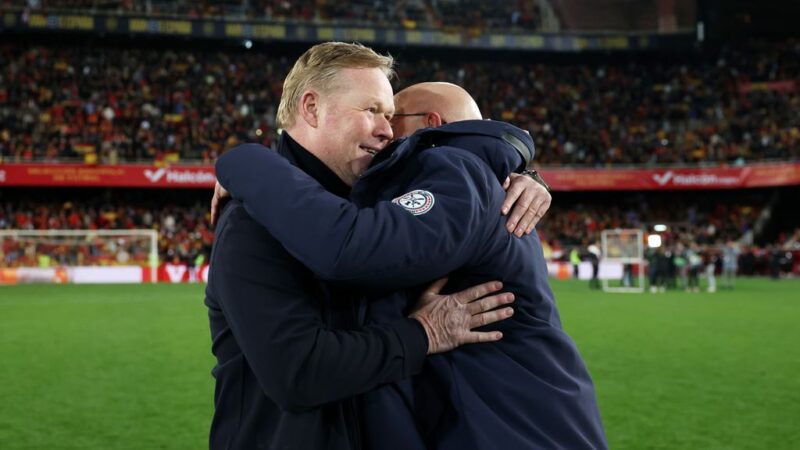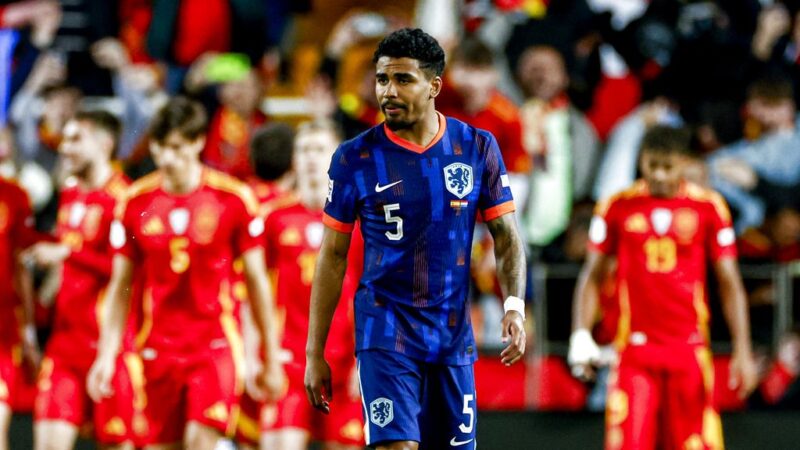Lodeweges now making bills for Heitinga: ‘I love assistant role’

NOS Football–
-
Eline de Zeeuw
reporter NOS Sports
-
Eline de Zeeuw
reporter NOS Sports
“We said: Ronald, if you want to take risks, you have to do this!”, said Dwight Lodeweges. “At first the national coach didn’t want to, because he was afraid of losing to Germany by big numbers then. But then the 2-1 fell and he snatched the bill out of my hands.”
The rest is history: Ronald Koeman in turn gave the piece of paper to the player closest to him, Kenny Tete, who in turn passed it on to Matthijs de Ligt, after which the message finally reached Virgil van Dijk.
The defender was then told to play in the striker to force the equalizer, and successfully (2-2). A simple bill saved Orange’s evening, and thus the Netherlands managed to reach the final round of the Nations League.
Rarely, moreover, was the influence of an assistant coach so clearly visible: because the A4 sheet with the plan of attack was recovered by the NOS after the match along the pitch, “Lodeweges’ bill” unintentionally became a national concept. At auction, it even fetched 35,000 euros.

2018: how a simple bill saved Orange’s evening
“Later I even got bills from the neighboring boys in the mailbox with the same formation on them, but with their names filled in,” Lodeweges now laughs looking back. “Oh well, I especially liked the fact that the little plan had worked. It was a good example of how, as an assistant, I try to get the head coach to think.”
Indeed, Lodeweges makes this kind of bill more often. In fact: he does it every match. Then as an assistant with Oranje, now as John Heitinga’s right-hand man at Ajax.
“We as assistants are there to keep calm and keep an overview when the head coach is coaching along the sidelines or absorbed in emotions. I also make the bills for John now, that’s how I try to think for him as well.”
If Ajax calls, you don’t say no
Relaxed, Lodeweges (65) sits in an Ajax tracksuit at De Toekomst in early April. When Heitinga succeeded the sacked Alfred Schreuder in January, the latter had one clear wish: as a rookie premier league coach, he wanted the experienced Lodeweges by his side.
Shortly before that, Lodeweges had just decided to slow down. He wanted to be home more often and do more with his wife, who had recently had an accident. “But when Ajax calls, you don’t say no. Besides, fortunately my wife is doing much better again. I couldn’t pass this up, this was too good.”
And so he resigned his position on the Supervisory Board at SC Heerenveen after only a month, amateur club VVOG had to continue without him, and he now drives almost daily from his hometown in Gelderland to Amsterdam.
He traded peace for a club in crisis. Lodeweges listens, watches and thinks with him. “Michael (Reiziger, ed.) and I talk a lot with John. It’s continuous consultation, support, and thinking.”
In almost 35 years, Lodeweges trained fifteen different clubs: he began his career as an assistant to Hennie Spijkerman at Go Ahead Eagles – “with no one I can talk about soccer like Hennie” – and then worked with Henk ten Cate, Foppe de Haan and Koeman, among others.
He later became head coach of PEC Zwolle, SC Heerenveen and Cambuur, among others. He also coached in Japan, Canada and the United Arab Emirates.
So yes, Lodeweges can speak from experience when he calls the difference between assistant and head coach one “of night and day. “I actually see it as two different professions. What comes on a head coach is immense and not to be underestimated. The pressure and accountability is enormous. The head coach is called to account when things go badly, the assistant is not. Especially at a club like Ajax, losing is really not an option.” In recent months, he will have experienced that firsthand.
Broadly speaking, working with different head coaches is the same, he says, but there are differences, for example, in how far someone hands over tasks. Often, the more experienced a trainer is, the more he dares to leave more to his assistants. Lodeweges praises Koeman, with whom he worked for two and a half years with the Dutch national team: “He was so experienced, he was not afraid to delegate.”
For example, the national coach sent his assistants on a mission to the 2018 Orange-less World Cup to analyze other countries’ systems. “We too tried to play 5-3-2 in the beginning, but Koeman thought that didn’t work well enough with the players we had. So Kees van Wonderen and I went to the World Cup to look at what style of play would suit our boys.”
“We had bite with Belgium: they played with the backs high, three central defenders and a box in midfield. We could pretty much fill in all the players. We presented that with images to Koeman and after an hour of chatting he said: we are going to do it like that. I love that.”
A less experienced coach like Heitinga is more on top of things
So whether a less experienced coach like Heitinga is more on top of it? “Yes, he’s more on top of it. But he has to be. If you lead a top club that is not on the right side of the coin and you have to fix that, you don’t do it with sweet nothings. John has to make his mark.”
As the club empties and the chagrin increases, Lodeweges completes his final weeks at Ajax. His contact runs until the end of the season.
Lodeweges himself no longer needs to be head coach. You have to be “younger and more energetic” for that, he thinks. “I just love this role.” So what will he do next? “I can relate very well to Dick Advocaat, who just can’t quit. But I’m going to do that, really.”





